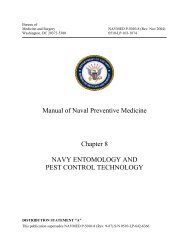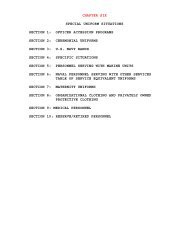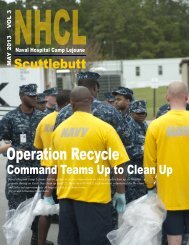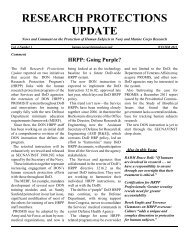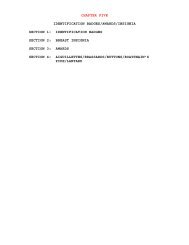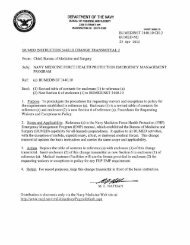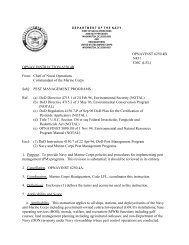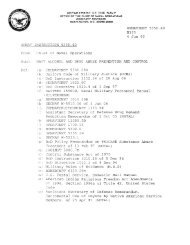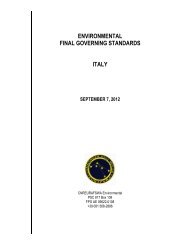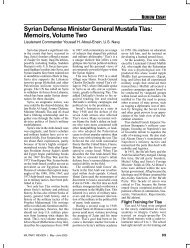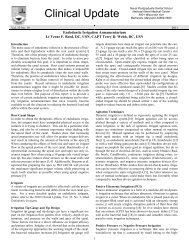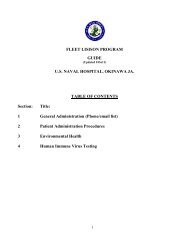Change 146 Manual of the Medical Department ... - Navy Medicine
Change 146 Manual of the Medical Department ... - Navy Medicine
Change 146 Manual of the Medical Department ... - Navy Medicine
Create successful ePaper yourself
Turn your PDF publications into a flip-book with our unique Google optimized e-Paper software.
Article 15-103<br />
(a) Treatment <strong>of</strong> Mood Disorders and/or<br />
Anxiety Disorders (including Adjustment Disorders)<br />
with psychopharmaceuticals to achieve and maintain<br />
stabilization is waiverable for Nuclear Field Duty<br />
qualified personnel, depending on <strong>the</strong> medications<br />
used and <strong>the</strong> timelines involved (see MANMED<br />
article 15-103, paragraph (4)(d)(2)(b)7. below).<br />
Candidates requiring treatment with psychopharmaceuticals<br />
are disqualified and not eligible for a waiver<br />
until treatment is complete (MANMED article 15-<br />
103, paragraph (4)(d)(11) applies).<br />
(b) Waivers for continuation <strong>of</strong> Nuclear<br />
Field Duty while taking selected psychopharmaceuticals<br />
for Mood Disorders and/or Anxiety Disorders<br />
(including Adjustment Disorder) will require<br />
that all <strong>of</strong> <strong>the</strong> following criteria are met:<br />
1. The Service member must be<br />
evaluated by a military-employed psychiatrist.<br />
2. The condition must be categorized<br />
as stable, resolved, or in remission.<br />
3. The Service member must be<br />
clinically stable on <strong>the</strong> recommended dosage <strong>of</strong><br />
medication without any military duty performanceimpairing<br />
side effects.<br />
4. The Service member must have<br />
access to <strong>the</strong> recommended level <strong>of</strong> follow-up with<br />
<strong>the</strong>ir mental health provider and primary care manager<br />
(PCM). For submarine duty personnel, <strong>the</strong><br />
condition must be stable enough to allow follow-up<br />
solely with an Independent Duty Corpsman for up to<br />
6 months at a time. Nuclear Field Duty personnel<br />
assigned to aircraft carriers (CVN) will have ready<br />
access to Licensed Independent Practitioners (Physician<br />
Assistant (PA), Nurse Practitioner (NP), Physician,<br />
and Psychologist) for follow-up.<br />
5. Personnel who have experienced<br />
suicidal ideation (SI) in conjunction with <strong>the</strong>ir<br />
Mood and/or Anxiety Disorder may still be considered<br />
for a psychopharmaceutical use waiver in<br />
conjunction with a waiver for <strong>the</strong>ir underlying<br />
psychological condition and <strong>the</strong>ir suicidal behavior.<br />
6. Individuals who have displayed<br />
suicidality in <strong>the</strong> form <strong>of</strong> a suicidal gesture (SG) or<br />
suicide attempt (SA), as defined by a mental health<br />
pr<strong>of</strong>essional, will not be eligible for a psychopharmaceutical<br />
use waiver. A waiver to return to Nuclear<br />
Field Duty after an SG or SA will require cessation<br />
<strong>of</strong> medication use in conjunction with complete<br />
resolution <strong>of</strong> <strong>the</strong>ir condition, in addition to a recommendation<br />
from a doctoral level mental health provider<br />
and <strong>the</strong> UMO.<br />
<strong>Manual</strong> <strong>of</strong> <strong>the</strong> <strong>Medical</strong> <strong>Department</strong><br />
7. Psychopharmaceutical specifics:<br />
Requirements before waiver consideration include:<br />
i. Only Selective Serotonin<br />
Reuptake Inhibitor (SSRI)/Serotonin-Norepinephrine<br />
Reuptake Inhibitor (SNRI) medications are authorized<br />
for consideration <strong>of</strong> a waiver at this time.<br />
ii. The Service member must<br />
have been on <strong>the</strong> medication for at least 3 months<br />
without complications or performance-impairing side<br />
effects.<br />
iii. The Service member must<br />
be on a stable dosage <strong>of</strong> medication (i.e., no dose<br />
change in <strong>the</strong> month prior to waiver submission).<br />
iv. The Service member’s condition<br />
must be well-controlled (asymptomatic) on <strong>the</strong><br />
current dose <strong>of</strong> medication.<br />
(3) Post-Partum Depression <strong>of</strong> limited<br />
duration is not normally disqualifying for Nuclear<br />
Field Duty. Cases which resolve quickly, within <strong>the</strong><br />
6-week maternity leave period, may be found fit for<br />
Nuclear Field Duty by <strong>the</strong> attending UMO or RAM.<br />
Cases <strong>of</strong> longer duration and/or requiring psychopharmaceutical<br />
use and/or involving suicidality are<br />
disqualifying and waiver will be considered after<br />
complete resolution.<br />
(4) Disorders usually first diagnosed in<br />
infancy, childhood, or adolescence, sleep disorders,<br />
and sexual and gender identity disorders are disqualifying<br />
if <strong>the</strong>y interfere with safety and reliability<br />
or foster a perception <strong>of</strong> impairment.<br />
(a) Current Attention Deficit Hyperactivity<br />
Disorder (ADHD) is disqualifying, but a<br />
history <strong>of</strong> ADHD greater than 1 year prior to military<br />
service is not disqualifying.<br />
(b) Communication disorders, including<br />
but not limited to any speech impediment<br />
which significantly interferes with production <strong>of</strong><br />
speech, repeating <strong>of</strong> commands, or allowing clear<br />
verbal communications, are disqualifying.<br />
(5) Personality disorders are disqualifying<br />
for Nuclear Field Duty candidates. For nuclear<br />
field designated personnel, personality disorders may<br />
be administratively disqualifying if <strong>the</strong>y are <strong>of</strong> significant<br />
severity as to preclude safe and successful performance<br />
<strong>of</strong> duties. In <strong>the</strong>se cases, administrative<br />
processing should be pursued per <strong>the</strong> Military Personnel<br />
<strong>Manual</strong> (MILPERSMAN). The term “environmental<br />
unadaptability” is not a medical diagnosis<br />
and should not be used in medical assessments. A<br />
command may use “environmental unadaptability” as<br />
15-80 <strong>Change</strong> <strong>146</strong> 23 Jan 2014




